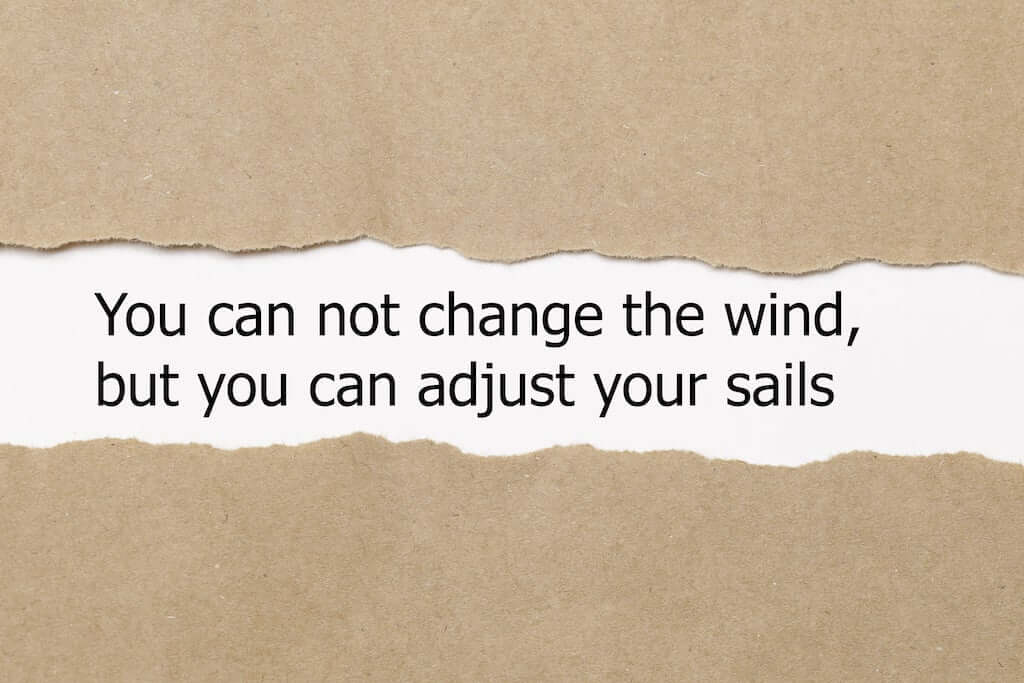Sustainable Caregiving Strategies
Strategy: Acceptance ~ When Losing is Winning
One reason that caregiving is stressful is due to obstacles. Obstacles make us emotional and emotion clouds our thinking and our clear view of the obstacle. Emotions magnify the obstacle’s power and in doing so, can minimize our own power. Acceptance can help us flip the obstacle so that it works for us rather than against us. When we acknowledge that a situation is not ideal, but move to acceptance, we can then make choices that allow us to turn an obstacle into an opportunity.

“The impediment to action advances action. What stands in the way becomes the way.”
Marcus Aurelius
When we ask ourselves, how we might use this situation to our advantage, we begin to examine it with a different lens. With this strategy, we can take back our power and see the gifts that the obstacles obscure, the gifts that are hiding in plain sight.
The obstacles:
Obstacles we encountered while caregiving may include the healthcare system, community systems, family dynamics, and possibly our situation. Our care recipient may feel like an obstacle at times.
For example, maybe you loved to travel and caregiving responsibilities curtailed your ability to be away from your home for any length of time. How could you use that time to your advantage? You might study the language and culture of your favorite or next destination. You might collect your memories and photos and write a travel memoir. You might create a detailed plan to see all of the places on your bucket list so that when caregiving responsibilities come to an end and you are ready to take steps back into the world.

Flip the script:
What if you flipped the script from “I have to be a caregiver” to “I get to be a caregiver”? What might your caregiving journey reveal? With training, practice, and a disciplined perspective, we can begin to look at challenges in a different way and more quickly see the opportunity. We may even bypass the negative emotions altogether. When we see a clear path forward, we avoid the negative feelings that come from uncertainty and the painful emotions that come from negative thoughts. It is not likely that we will begin to welcome obstacles, but we will no longer be paralyzed by them.
The gift beneath the obstacle:
A new perspective will not make caregiving easier. However, aspects of caregiving will be easier to accept when you discover the gift beneath the obstacle and use it as an opportunity for growth or discovery. As you learn and have new experiences, you are gaining skills and resilience that will provide benefits beyond caregiving. You may use these skills to help other family caregivers or to improve the systems or sources of the obstacles.
Seamless Practice

Reflect:
- Think of a time in your life when you faced an enormous obstacle and were able to use it as a springboard to a better situation. Can you remember feeling the shift in your motivation. The resilience that you demonstrated is your power.
- What obstacles have you faced while caring for your family member? Think of one obstacle in particular. How does the obstacle make you feel? Sit with those feelings for a few minutes.
- Begin to shift your perspective. What opportunity might you be missing due to the focus on your feelings?
Journal:
- Describe a recent or current obstacle. What happened? What emotions did the obstacle evoke? How did you feel when facing the obstacle?
- What about that obstacle presented the greatest challenge?
- What would it look like if you flipped the obstacle over and examined it from all angles?
- What steps will allow you to transform the obstacle into an opportunity?
- What are the possible gifts that were obscured by the obstacle?


Apply:
- Begin the steps that you identified in your journal that will enable you to turn the obstacle into an opportunity.
- Continue to identify obstacles and journal the ways in which they may work to your advantage.
